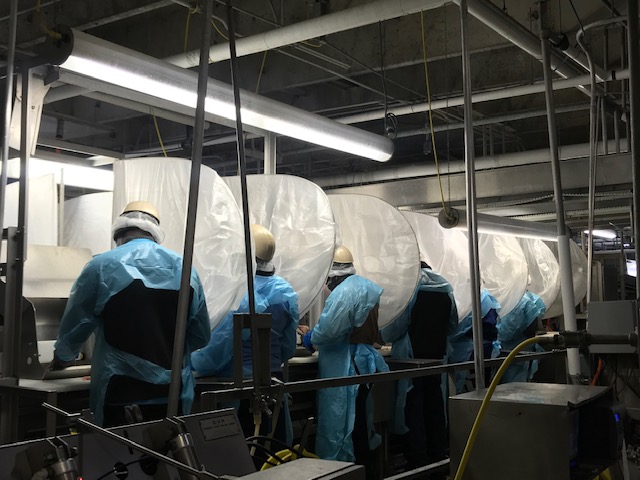Competitive grant funding will help workers impacted by pandemic-related health and safety costs.

USDA unveiled a new Farm and Food Workers Relief grant program to provide $600 in individual relief to farmworkers, meatpacking workers and frontline grocery workers for expenses incurred due to the COVID-19 pandemic. The total $700 million competitive grant program is intended to defray costs for reasonable and necessary personal, family or living expenses related to the COVID-19 pandemic, such as costs for personal protective equipment, dependent care and expenses associated with quarantines and testing related to the COVID-19 pandemic.
In announcing the details of the program with Secretary of Agriculture Tom Vilsack in a call Tuesday afternoon with media, United Food and Commercial Workers International President Marc Perrone shares that while the rest of America could work from home during the pandemic, UFCW members were on the frontlines of some of the deadliest outbreaks of COVID-19.
Specifically, Perrone shared that essential food workers were hit especially hard with 483 frontline worker deaths and at least 93,900 frontline workers infected or exposed. The UFCW estimates 132 meatpacking worker deaths and 22,400 meatpacking workers infected or exposed. An estimated 67 food processing worker deaths resulted from 13,100 food processing workers infected or exposed. An estimated 198 grocery worker deaths resulted from at least 43,900 grocery workers infected or exposed.
Perrone says although much more must be done to compensate frontline workers, the new grant builds on progress and recognizes the service and sacrifices critical in keeping the food industry online during the pandemic.
“Meatpacking plants experienced some of the most deadly COVID-19 outbreaks when the pandemic first began and there are few workers more deserving of our thanks and support. Across the country, meatpacking workers have had to use their own money to pay for personal protective equipment to stay safe on the job, shoulder the burden of increased childcare costs, take on expenses from COVID-19 testing and quarantining, and much more,” Perrone says. “Grocery workers continue to face health risk during this COVID-19 Delta surge and the pilot program announced today is a strong step toward providing them with the assistance they and their families need.”
Funds will be awarded through grants to state agencies, Tribal entities and non-profit organizations serving farmworkers and meatpacking workers ranging from $5 million to $50 million. USDA is setting aside $20 million for at least one pilot to provide targeted support to front-line grocery workers. Eligible entities must demonstrate the capacity to reimburse farmworkers and meatpacking workers for up to $600 for expenses incurred due to the novel coronavirus 2019 pandemic.
The grant requires applicants to show connectedness to hard-to-reach worker populations either directly or in partnerships with other local organizations. Applicants should be able to describe how they will partner with smaller organizations to facilitate financial relief to such populations. Vilsack says by working with organizations, those who may not have legal status in the U.S. may be able to receive the funds.
“The pandemic didn’t choose between documented and undocumented workers,” Vilsack says of those people who work on the farm or in food industries and put themselves at risk.
“The UFW Foundation worked tirelessly to advance legislation that would empower USDA to support farm workers throughout this pandemic,” says Diana Tellefson Torres, UFW Foundation executive director. “We now applaud the Biden-Harris Administration, Secretary Vilsack and USDA for recognizing the vital role of farm workers in the nation’s food security and economy, through this new program. The work is not done until this much-needed pandemic relief reaches farm workers across the nation, and we look forward to working with USDA to that end.”
The new program is funded by the Consolidated Appropriations Act of 2021. House Agriculture Committee Chairman David Scott, D-Ga., says the FFWR grant program is critical and will support farmworkers who bore many of the costs associated with ensuring health and safety during the pandemic and beyond.
“While many of us were staying home, these folks assumed personal risk, going to work to ensure a stable food supply for our nation. The House Agriculture Committee looks forward to continuing to work alongside Secretary Vilsack and the USDA to support farmers, farm workers and other food sector workers,” says Scott.
The Agricultural Marketing Service will offer technical assistance through one or more partners and webinars for applicants to help them understand the RFA, once it is published. Additionally, grants management specialists will be available to answer any incoming questions and emails after the details are announced. For more information about upcoming webinars, grant eligibility and program requirements, visit the FFWR webpage at www.ams.usda.gov/services/grants/ffwr, or contact FFWR at [email protected].
Vilsack also says USDA will soon be announcing a separate $700 million suite of pandemic safety and response grants for producers, processors, farmers markets, distributors and seafood processors and vessels impacted by COVID-19.
About the Author(s)
You May Also Like





